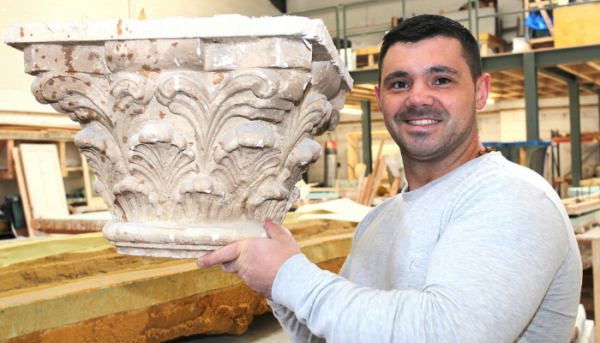The Post: Plasterer specialising in film set production, PJ Sets Ltd
The Post Holder: Joe McGuinness
Following his training as a construction apprentice, Joe McGuinness is not only running his own business, but his plastering skills have helped him develop a career in set-making for films. The film industry is an amazing one to be a part of – work hard and you’ll do well.
Give a brief outline of your career to date.
At the age of 16 I started Springvale Learning. As part of my training I worked in a building company as a carpenter and from there I had the opportunity to work as a plasterer. I quickly realised that this was the career for me.
I was an apprentice at a building company for four years and alongside this I completed courses at Belfast Met which further developed my training and skills in plastering.
While I was at Belfast Met, my tutor told me about the opportunities available at Titanic Film Studios especially in relation to set building, which required people with plastering training and skills. I made an approach and since then I’ve been working in different parts of the world on a range of amazing film projects. This experience encouraged me to start my own company – PJ Sets Ltd.
What was your favourite subject at school?
Maths & Technology.
Did you go on to further/higher education, if so what did you study and where?
From Corpus Christi College I went onto Springvale Learning to do Level 1 & Level 2 solid plastering. From there, I went on to Belfast Met and completed Level 3 solid plastering and Level 3 fibrous plastering.
How did you get into your area of work?
An opportunity came up during my time at Belfast Met, so it really started from there.
Is this what you always wanted to do?
To be honest, I wasn’t sure what I wanted to do. However, a combination of work experience, my apprenticeship experience and putting the time and effort into further education at Belfast Met really did open doors for me.
Were there any particular essential qualifications or experience needed?
To get into my current role at the film studios, I needed to have Level 1 & 2 solid plastering, as well as Level 3 fibrous plastering. My apprenticeship experience of working on a construction site was also a huge benefit.
Are there alternative routes into the job?
A construction apprenticeship alongside skills and training courses would be the main pathway.
What are the main personal skills your job requires?
Listening and teamwork. Being able to work in high pressure situations and work to deadlines. Patience to get the job done in a timely and professional manner and being flexible, as projects can change at the very last minute.
What does a typical day entail?
The next step would be to set it out on a bench to begin making a model. For this I would make sure all measurements are correct, even the slightest mistake would throw the whole project as I might not be making one but multiple casts.
There would be many catch up and progress discussions as the project develops.
What are the best and most challenging aspects of the job?
The good aspects of my job would be that it’s a combination of plastering/joinery work which I enjoy. I like the diversity of what I do and that every day is not the same. For example, one week I could be working on a cast for a castle and the next a spaceship. At the end of it all you get to see all your hard work on screen being appreciated by many.
The most challenging aspect would be the lull period in between jobs, it could be one week or one month until the next project. But with sets going up all over Ireland it’s clear to see it’s a growing industry with – hopefully – lulls being few and far between in the near future!
Why is what you do important?
It’s an important part of the film production. I get a drawing from the art department with their idea/vision for the film and the work that I do, alongside the team, in the plastering department has a huge input on bringing it to life. The set needs to be realistic, appropriate and fit with the film being made.
How has Covid-19 impacted your business/role?
With Covid-19 and lockdown, the film industry was virtually at a stand still. This took a massive toll on my business for a couple of years. But now, things are slowly getting back to normal and I am starting to see work pick up again.
What adjustments have you had to make?
The construction and film industries have covid guidelines in place – I ensure I follow these for the safety of everyone involved on the project.
What advice would you give anyone looking to follow a similar career path?
Listen and learn from the people working alongside you, especially those who have industry experience. The film industry is an amazing one to be a part of – work hard and you’ll do well.
If you weren’t doing this what would you like to do?
I would still be working in the construction industry.
What is the one piece of advice you would give to yourself on your first day?
Take your time and learn from the people around you.
Describe your ideal day off.
A day out with my partner and my daughter.
And finally, what’s the key to any successful job search?
Be persistent in your search for what you want to do but also consider an apprenticeship role, it could lead you to places you didn’t expect possible.
For further information on careers in construction, advice on pathways into the industry as well as the wide range of career options available visit https://citbni.org.uk/home.aspx


